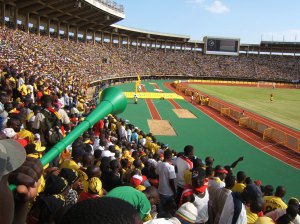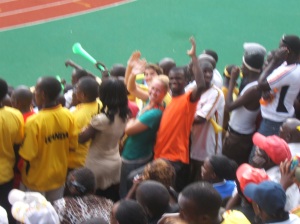A couple of weeks ago, my American compatriots and I attended our first Uganda National team game. For me, it was my first international match of any African nation; Uganda vs. Guinea Bissau. If it hadn’t been apparent in my past four months in Africa that Africans love football, it became abundantly apparent at this match. I should explain that the Uganda Cranes, as their team is called, are not good. In fact, I would wager that most University soccer teams in the states would be the victors in a friendly match. This does not stop the Ugandans from coming out in hoards to support their beloved team. Aside from the World Cup, I have never seen such immense support for a national soccer team, and this game was only an early qualifier for the Africa Cup of Nations. There was not an empty seat in the stadium, in fact I am not sure anyone was sitting. You literally had to fight your way through body mass to even see the pitch from the stairwell. Probably a fire hazard, yes, but when has safety ever quelled the visceral passion for football? We brought with us Banji, our Uganda friend and volunteer in Ndejje, and Raphael, our wonderful Congolese friend who runs the second Soccer Without Borders program in Nsambya. Their excitement at the game was matched by every child we left behind in Ndejje; Ugandan, Congolese, Sudanese, all of them would be watching at any TV screen they could find in our tiny town. It was amazing to watch the people of this country come together, the power that one game of football had to not only excite the Ugandan nationals, but also refugees who have not yet lived there a decade. I was particularly touched by Rapha’s enthusiasm for the match, knowing his strong Congolese identity. In spite of the difficulties we have been having in Uganda, it was a breath of fresh air to see all of these people come together and support a team who may not even win.
I have also found much hope and inspiration in Rapha and his program in Nsambya. Nsambya is just outside Kampala, I would consider it the outskirts of the city. A poorer area and home to many refugees, it is a place that needs a program like Soccer Without Borders. After months of searching, two weeks ago Rapha finally found a building he can rent near the soccer pitch in Nsambya that can serve as both his home and a community center for the kids he works with. Rapha already has a successful after-school and weekend soccer program, with teams from ages 12 up to their early twenties, both boys and girls. He spends most of his spare time leading the youth group at his church and organizing people to come and teach them about finances, HIV/AIDS and English language. It is amazing how many children’s lives he has touched and how hard he works to help refugee youth in his community. In spite of his lack of experience in teaching children, or formal training in education, he wants to help the kids who cannot afford to go to school. School fees within the district of Kampala are astronomical for refugees. While fees for Ugandans are reasonable (although they should be zero, corruption is everywhere), refugees are asked to pay fees that can reach 100 USD per term. 100 USD is what a family can live on for a year in this community, so you can imagine that paying that money is impossible. With our help, Rapha has organized a group of youth who do not attend school, girls and boys ages ranging from 12-18, to come to his new center 3 days per week. He intends to teach them English as well as provide them with reading and art materials that they can use while spending time at the center. He will have soccer trainings with them during the day. This program is not designed to be a substitute for real school, but it is at least a place where they can go to learn and be creative, and English is an extremely valuable asset in Uganda. Ethan, a new SWB intern, and I spent the first couple of sessions with Rapha teaching him games he can incorporate with football to improve English skills. He was immensely grateful for our help and is eager to learn more skills and tools to help these kids; something I hope that SWB can provide in the coming months. The motivation for these kids to come to the new center started originally with soccer training, but I think they are realizing that they will glean much more than that from their time with Rapha. Soccer was the catalyst for this work. It was the reason Rapha started with SWB. It was the reason the kids came in the first place. This is where you see the power of the love of the game that was so evident in Mandela National Stadium that Saturday.





